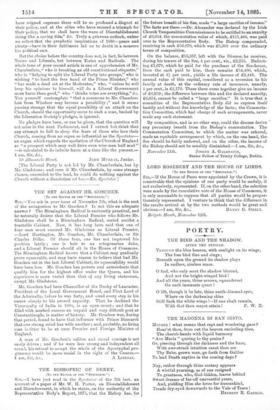THE BISHOPRIC OF DERRY.
LTO THE EDITOR OF THE " SPECTATOR:1
SIR,—I have just read in the Spectator of the 7th inst. an account of a paper of Mr. W. H. Porter, on Disestablishment and Disendowment, in which he states, on the authority of the Representative Body's Report, 1875, that the Bishop has,lor
the future benefit of his See, made "a large sacrifice of income." The facts are these :—Dr. Alexander was declared by the Irish Church Temporalities Commissioners to be entitled to an annuity of £6,854, the commutation value of which, £111,466, was paid over to the Representative Body. The Bishop compounded, receiving in cash £56,079, which was £5,300 over the ordinary terms of composition.
On the balance, £55,387, left with the Diocese, he receives, dining his tenure of the See, 4 per cent., viz., £2,215. Deduct- ing 21,679, which he paid for the purchase of the See-house, from the cash paid to him, there remains £54,400, which,. invested at 41 per cent., yields a life income of £2,448. The annual value of this capital, considered as a reversion to his family at death, at the ordinary rate of insurance, namely, 4 per cent., is £2,176. These three sums together give an income of £6,839; the difference between this and the declared annuity, 26,854, cannot be called a "large sacrifice." It is true that a committee of the Representative Body did so express itself hastily and without due knowledge of the facts ; the Commuta- tion Committee, which had charge of such arrangements, never made any such statement.
By composition, and in no other way, could the diocese derive any pecuniary benefit from the Bishop's commutation. The Commutation Committee, to which the matter was referred, made an equitable arrangement by which, on the one hand, the See should be fairly endowed, and on the other, the income of the Bishop should not be sensibly diminished.—I am, Sir, &c., November 11th. JOSEPH A. GALBRAITH, Senior Fellow of Trinity College, Dublin.






































 Previous page
Previous page